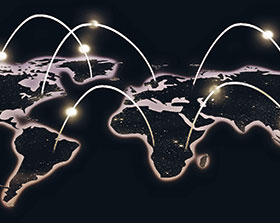

World trade volumes increased by 0.9% in the first month of 2018, following a strong year of global trade in 2017, which demonstrates that globalisation is still on the rise. As economies, markets and companies become increasingly interconnected and globalised, so do supply chains and labour markets – only, the risk considerations become more complex.
“Globalisation and the global value chain continue to create opportunities for companies to grow and expand into new regions, where these trends are also driving change in procurement and hiring practices. Companies today have access to suppliers worldwide to meet their supply chain and procurement needs, as well as global talent pools from which to source desired skills to bulk up their workforce,” says Francois van der Merwe, head of global screening, Managed Integrity Evaluation (MIE).
A study released by Finaccord in 2017 indicated that based on trends, the number of multinationals worldwide is projected to reach 13 900 by 2021. Linked to this, the number of expatriate employees or corporate transferees within these enterprises is projected to exceed one million by this same time. A further report by Finaccord on global expatriates highlighted that the total number of expatriates in the world market was projected to reach 56.8 million by 2017, or 0.77% of the total global population.
Van der Merwe believes these numbers indicate that companies and individuals are indeed moving across borders like never before. “With this, however, companies need to be even more vigilant in their procurement and human resources processes and practices. Appropriate background screening and vetting therefore remain critical to proactively managing risk exposure to the business. Supplier and employee candidates should be screened irrespective of where they are from – and be screened based on the credentials of the applicable country.
“If we look at Africa, for example, the continent is increasingly being recognised by multinational companies as a land of opportunity – both for companies who are looking to diversify or expand their operations, and those who seek to attract talent from new markets. Similarly, rapidly growing industries and companies across Africa offer meaningful career growth opportunities for professionals from all over the world,” adds Van der Merwe. “While previously it was thought a near impossible task to conduct thorough background checks for Africa, the background screening industry has caught up with other industries on the continent.”
Although most countries – around the world and in Africa – have legislation relating to personal privacy, human rights and employment, currently there is insufficient industry specific and cross-border legislation to regulate and support background screening. Added to this, there are distinct differences in the regulatory and legal landscapes between different countries. This does present some challenges and add complexities to the legal obligations of conducting thorough background checks across borders.
“Understanding the differences in the legal landscapes, and knowing how to navigate these, is crucial to avoid any negligent-hiring lawsuits, penalties or hefty fines. Therefore, the key to overcoming the complexities when appointing a partner or supplier, or hiring across borders, is that a company must have a global screening programme. And partner with a reputable service provider that works in and has entrenched knowledge of global markets as well as one that offers added assurance that all checks are conducted thoroughly, in a legitimate and compliant manner,” concludes Van der Merwe.
For more information contact Managed Integrity Evaluation (MIE), +27 12 644 4000, [email protected], www.mie.co.za

© Technews Publishing (Pty) Ltd. | All Rights Reserved.